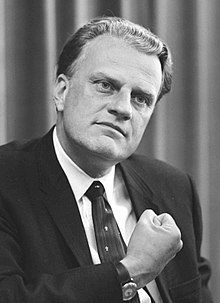Billy Graham
Billy Graham (William Franklin Graham Jr.) was an American evangelical Christian minister and one of the most influential preachers of the 20th century. He was born on November 7, 1918, in Charlotte, North Carolina, and passed away on February 21, 2018, in Montreat, North Carolina, at the age of 99. Known for his powerful preaching, global evangelism, and efforts to bring Christianity to millions of people worldwide, Graham played a key role in shaping modern evangelical Christianity. He was an advisor to U.S. presidents, a leading figure in the Civil Rights Movement, and is often referred to as “America’s Pastor” due to his widespread influence.
Graham operated a variety of media and publishing outlets, according to his staff, more than 3.2 million people have responded to the invitation at Billy Graham Crusades to “accept Jesus Christ as their personal savior”. Graham’s lifetime audience, including radio and television broadcasts, likely surpassed billions of people. As a result of his crusades, Graham preached the gospel to more people, live and in-person, than anyone in the history of Christianity. Graham was on Gallup’s list of most admired men and women a record-61 times. Grant Wacker wrote that, by the mid-1960s, he had become the “Great Legitimator”, saying: “By then his presence conferred status on presidents, acceptability on wars, shame on racial prejudice, desirability on decency, dishonor on indecency, and prestige on civic events.”
Early Life and Conversion
Billy Graham was born to William Franklin Graham Sr. and Morrow Coffey Graham, who were dairy farmers. Raised in a devout Christian household, Graham was a Presbyterian, but his personal commitment to Christianity did not come until he was 16 years old. In 1934, during a revival meeting led by the evangelist Mordecai Ham in Charlotte, Billy Graham had a profound spiritual experience that led him to accept Jesus Christ as his personal savior. This moment of conversion marked the beginning of his journey toward becoming one of the most famous evangelists in modern history.
Education and Early Ministry
After high school, Graham enrolled at Bob Jones College but transferred due to its strict atmosphere. He then attended Florida Bible Institute (now Trinity College of Florida) where he began preaching in small churches and local communities. His passion for evangelism continued to grow, and in 1940, he was ordained as a Southern Baptist minister.
In 1943, Graham graduated from Wheaton College in Illinois with a degree in anthropology. While at Wheaton, he met his future wife, Ruth Bell, the daughter of medical missionaries in China. They were married in 1943 and had five children: Virginia (Gigi), Anne, Ruth, Franklin, and Ned. Ruth played a significant role in supporting Graham’s ministry while raising their family.
Rise to Fame: The Los Angeles Crusade (1949)
Billy Graham’s rise to national and international fame began with his Los Angeles Crusade in 1949. Sponsored by Christian businessmen, the crusade was scheduled to last three weeks but was extended to eight weeks due to the overwhelming response. Graham’s sermons attracted significant media attention, and his message of salvation through Christ resonated with thousands of attendees.
This crusade catapulted him into the public eye, and soon after, William Randolph Hearst, the powerful newspaper magnate, instructed his editors to “puff Graham.” The media coverage helped propel Billy Graham into the national spotlight, making him a household name across America. From that point forward, Graham’s crusades attracted huge crowds and significant media coverage, establishing him as the leading evangelical voice of his time.
Founding the Billy Graham Evangelistic Association (1950)
In 1950, Billy Graham founded the Billy Graham Evangelistic Association (BGEA) in Minneapolis, Minnesota. The organization became the foundation for his global ministry, coordinating his crusades, radio programs, and television broadcasts. Through the BGEA, Graham expanded his reach beyond live audiences, using radio, television, and later the internet to reach millions of people worldwide.
His radio program, “The Hour of Decision,” became widely popular and aired for decades. Additionally, Graham’s television crusades brought his preaching into homes across America and around the world, allowing him to reach far larger audiences than any previous evangelist.
Global Crusades and Evangelism
Billy Graham’s ministry was truly global, holding more than 400 crusades in over 185 countries throughout his career. His largest gathering took place in Seoul, South Korea, in 1973, where over 1.1 million people attended a single service.
Graham’s message was consistently centered on the Gospel of Jesus Christ, emphasizing the need for personal repentance, faith, and commitment to Jesus as Savior. His straightforward, non-denominational message transcended sectarian boundaries and attracted people from all walks of life, making him a unifying figure among Christians.
In addition to his crusades, Graham conducted numerous radio and television programs, wrote more than 30 books, and utilized every available medium to share his message of hope, salvation, and peace through faith in Jesus Christ.
Influence on U.S. Presidents and Political Leaders
Billy Graham was often referred to as the “Pastor to Presidents” due to his personal relationships with every U.S. president from Harry Truman to Barack Obama. Graham offered spiritual guidance and counsel to many American leaders, though he was careful to maintain a nonpartisan approach to politics. Some of the presidents he had close relationships with included Dwight D. Eisenhower, Lyndon B. Johnson, and especially Richard Nixon, with whom he had a particularly strong friendship.
Although he occasionally made public comments on political issues, particularly during the Cold War, Graham mostly avoided direct involvement in politics, focusing instead on his evangelistic mission. His influence, however, was far-reaching, as he sought to bring spiritual perspectives to critical issues like civil rights, communism, and nuclear disarmament.
Civil Rights Movement and Social Justice
While Billy Graham’s primary focus was on evangelism, he played an important role in promoting racial equality during the Civil Rights Movement. In the 1950s, he took the bold step of integrating his crusades, insisting that people of all races be allowed to sit together at his events. This was a controversial decision at the time, particularly in the segregated South.
Graham was a friend and supporter of Dr. Martin Luther King Jr., who praised Graham for his willingness to stand against segregation. Although Graham did not march in civil rights protests, he used his platform to advocate for racial reconciliation and encouraged churches to break down barriers of prejudice.
Graham also addressed issues of poverty, human suffering, and injustice in his sermons, although his primary focus remained the salvation of souls.
Personal Life and Legacy
Billy Graham remained deeply committed to his family throughout his ministry. His wife, Ruth Bell Graham, was a significant source of strength and inspiration. She managed their home in Montreat, North Carolina, where the couple raised their five children. Ruth passed away in 2007 after 64 years of marriage.
One of Graham’s sons, Franklin Graham, took over leadership of the Billy Graham Evangelistic Association and continues his father’s legacy of preaching and evangelism through his own organization, Samaritan’s Purse.
Billy Graham authored numerous books, including “Peace with God” (1953), “How to Be Born Again” (1977), and “Just As I Am” (1997), the latter of which is his autobiography.
Over the course of his lifetime, it is estimated that Billy Graham preached the Gospel to over 215 million people in live audiences and countless more through television, radio, and other media. His influence on the world of Christianity was unparalleled, and he is credited with helping to shape the modern evangelical movement.
Death and Tributes
Billy Graham passed away on February 21, 2018, at his home in Montreat, North Carolina, at the age of 99. Following his death, tributes poured in from religious leaders, politicians, and ordinary people around the world. Graham lay in honor in the Rotunda of the U.S. Capitol, a rare tribute for a private citizen.
His legacy lives on through the ministries and organizations he founded, as well as through the countless lives he touched through his preaching and evangelism. The Billy Graham Library in Charlotte, North Carolina, serves as a museum dedicated to his life and ministry.
Impact and Legacy
Billy Graham’s impact on evangelical Christianity, both in America and globally, cannot be overstated. He helped to popularize evangelicalism, giving it a respectable public face and promoting a faith that transcended denominational lines. Through his ministry, millions of people across the world heard the message of Christ, and his methods of using mass media—radio, television, and later the internet—set a new standard for global evangelism.
Graham’s approach was characterized by a simple and consistent message: the need for a personal relationship with Jesus Christ. His moral integrity, humility, and dedication to his calling earned him the trust and admiration of people from diverse backgrounds, and his work continues to inspire new generations of Christians. Graham’s efforts to promote unity among believers and his advocacy for racial integration are also important aspects of his legacy.
Billy Graham’s life was defined by his unwavering commitment to spreading the Gospel, his influence on American religious and social life, and his efforts to make Christianity accessible to people around the world. His legacy as a preacher, humanitarian, and counselor to global leaders will continue to resonate for generations to come.

